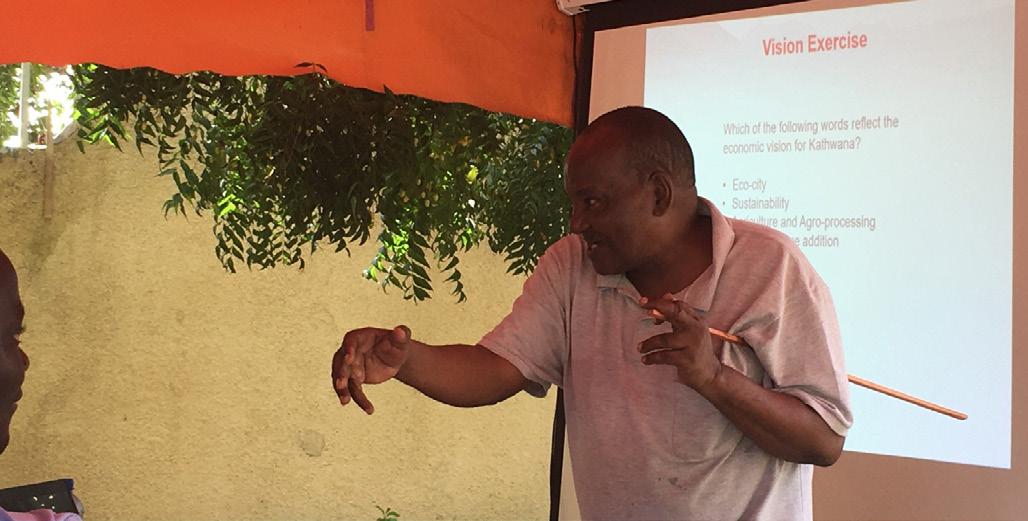
3 minute read
6.4 Recommendations for Capacity Building
Several areas are recommended for capacity building for the UEP implementation, with Municipality and departmental upskilling alongside partnerships and institutional structuring. These would support the effective and integrated approach to sustainable and inclusive economic sector development; infrastructure delivery, operation and maintenance; and climate resilience future proofing development. Project implementation Capacity building in project preparation, project management and delivery and maintenance from the Municipality, particularly when it comes to revenue generating activities and how to ensure revenue is received and used, is recommended. Working with the private sector for the delivery of urban services and projects is increasing in importance and requires knowledge and skills to support effective implementation of market driven solutions including PPP mechanism. The UEP promotes an integrated approach to development and there is a need to ensure silo thinking is removed from planning and delivery. This enables understanding of what needs to come first in the development process, and the wider dependencies and synergies. Covid-19 lessons
Strengthening preparedness and emergency response capacity is critical. This means better preparedness in terms of financing, service delivery and business continuity including budgeting for future crises, emergency operations centres, capacity building, drills, and human resources redeployment plans. This capacity building is recommended for Kathwana Municipality, where a cross-sector taskforce would be a recommended structure.
Data and digital tools Effective data gathering and analysis will support the monitoring of strategic objectives for the Municipality, including UEP project implementation, where capturing stakeholder information can be a key element of this. Data management of Municipality services, such as waste management, public transport service and open space maintenance, will support the Municipality in responding to its resident and business needs as well as monitoring the impact of these services. It is also recommended that digital platforms be developed, with business and community involvement, to better coordinate and deliver in the first instance, boda boda services and support online trading and supply chain linkages. Climate resilience
It will be important for the Municipality to develop understanding of climate change impacts across different sectors, exposure to risks and vulnerabilities. Such knowledge should be mainstreamed throughout services and projects to ensure resilience is imbedded. The capacity and capability to access available funds (set out in Section 6.3) should be improved. Building capacity among key planners and decision-makers so that climate change can be more widely integrated into County sector and development plans will help ensure that climate risks are adequately considered, and that the Municipality is well positioned to identify any potential opportunities arising. Opportunities might take the form of attracting investment for climate resilient investment programmes, or proactively identifying and supporting new business ventures which respond to changing conditions and consumer demand. More specific recommendations provided further below in Section 6.6. Social inclusion
It is recommended that the Municipality and its departments are supported in their understanding and upskilling around social inclusion, including Social Inclusion Awareness Creation for the Municipality and its stakeholders to embed a shift in attitudes and reduce discrimination. This is important to open up socio-economic opportunities and infrastructure and services to all groups, improving social cohesion and addressing the significant outcomes of exclusion. This capacity building with the Municipality would suitably support the better application of inclusive contracts such as the Access to Government Procurement Opportunities (AGPO) policy. It is recommended that the Programme: a. Establishes a Gender and Social Inclusion Implementation Unit. The
Unit will be responsible for ensuring the inclusion proposals in this UEP are implemented; there is appropriate coordination between the agencies and jurisdictions involved in inclusivity implementation; and the measures (including technical assistance) needed to strengthen the Municipality’s capacity to foster inclusion are delivered; b. Performs more Gender and Social
Inclusion Capacity Development -
In addition to the inclusion awareness presentations delivered during the UEP development process, all UEP players will need education on what inclusivity is, why it's important and how to achieve it in their areas, so that non-discrimination becomes part of the Programme’s culture and beyond; c. Develops a Gender and Social Inclusion monitoring framework - This will measure social inclusion progress throughout the UEP’s life. Some of the aspects to be checked include and are not limited to: number of SIGs invited to the Programme’s workshops; number of SIGs recruited into the Programme’s capacity building initiatives; number of SIGs employed by the Programme; level of inclusivity in the VC projects; inclusivity in climate adaptation and resilience approaches proposed for the Programme; attitudinal changes (if any) in the Programme stakeholders’ perspectives after social inclusion workshops etc.; Gender and Inclusion
Needs Awareness Level; inclusive infrastructure proposals delivered by






